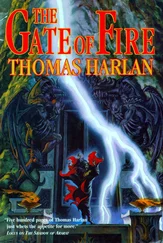Remy slowed his pace as he passed by and caught the child’s eye. Almost immediately the little boy settled down.
It was a strange fact that many physically or mentally challenged humans seemed to possess a unique gift of sight, as if their disabilities in the natural world somehow made them more sensitive to the unnatural. Very often they were able to glimpse the other side, and those who lived just beyond the veil.
This little boy could see Remy for what he truly was.
Angel.
And he seemed to like what he saw.
Taking advantage of the sudden calm, the boy’s parents hustled him by, his gaze tracking Remy as they passed.
Remy smiled, then turned to the reception window.
“May I help you?” a receptionist asked, sliding back a glass pane and looking at him with unblinking, laser beam eyes.
“Good morning,” he said, flipping open his wallet and showing her his identification. “My name is Remy Chandler. I’m a private investigator working a missing person’s case, and I was hoping to speak with Dr. Parsons.”
The woman’s glasses hung on a chain around her neck, and she placed them on her face so she could scrutinize his license. “Missing person?” she asked.
“Yes, a little girl, Zoe Saylor. I believe she is, or was, a patient of Dr. Parsons’.”
The receptionist removed her glasses and gazed up at Remy. “I’m sorry, Mr. Chandler, but the laws of patient confidentiality won’t allow us to acknowledge that a child has or has not received care at this hospital.”
“Yes, I’m aware of that, but the child’s mother did call Dr. Parsons this morning. . ”
“I’m sorry, Mr. Chandler,” she said with a dismissive smile, handing back his identification. “Have a nice day.” Then she slid the window closed as she reached for the trilling phone.
That was it; Remy was dismissed. It was as if he were suddenly invisible, and that gave him an idea.
Remy stepped back, as if he planned to leave. Then, glancing around to be sure no one was watching, he willed himself unseen. It was an angelic talent that had proven quite useful over his many years, but it bothered him to use it. Anything that fed the power of the force he kept locked inside him was never a good thing.
Remy walked past the reception desk toward a bank of elevators, where he found the hospital directory. Dr. Parsons’ office was on the first floor, so he headed down the corridor where he had seen the parents take their child, perusing the names over the doors until he found PARSONS.
The door was ajar, and he peered inside to find a middle-aged African American man with graying hair sitting at his desk looking over a file. Willing himself visible, Remy tapped his knuckle upon the door.
“Yes?” the man asked, looking over the top of a pair of bifocals balanced precariously on the tip of his nose.
“Dr. Parsons, I’m Remy Chandler,” Remy began as he pushed open the door to stand fully in the doorway. “I’m a private investigator.” He pulled out his wallet again and showed the man his identification.
“Mr. Chandler, you’ve already been told we can’t speak to you,” the man said with a hint of irritation.
“I guess news travels fast around here,” Remy chuckled. “Look, I have only a couple of very simple questions. Your patient’s confidentiality won’t be affected, I promise. Besides, Zoe Saylor’s mother did call to give her permission for you to speak with me.”
Parsons closed the file and stood. “A telephone call is not good enough, Mr. Chandler. We must have the parent’s permission in writing. Now, if you’ll excuse me, I’m late for a consultation.” He turned to one of three filing cabinets against the wall near his desk and stuffed the file into the second drawer.
“I just need to know if Zoe’s father was acting strangely on the day you last saw her or if he said anything out of the ordinary to anyone on your staff. Please, Dr. Parsons, even the smallest piece of information could be helpful,” Remy begged.
The doctor slammed the file drawer closed, then grasped Re-my’s arm by the elbow and guided him toward the door. “If you’d like, I can ask security to escort you out,” he said tightly.
Not wanting to cause a scene, Remy simply thanked the doctor for his time and headed down the hall. As soon as he was certain the doctor wasn’t watching him, he willed himself invisible again and walked back to the office.
Dr. Parsons had gone, so he quickly let himself inside and went directly to the file cabinets. Zoe’s file was in the top drawer of the last file cabinet. Pulling it out, he carried it to the doctor’s desk and began to thumb through the surprisingly thick file.
He found page after page of test results, therapy evaluations, and dated doctor’s notes, none of which proved helpful. But then in the back of the file, he found something familiar—childish drawings in crayon. Zoe certainly did like to draw.
Remy flipped through the illustrations, searching for something, anything, he could consider a clue. And then he found it—a crude drawing of a brown-skinned man dressed in what seemed to be green scrubs. Above the figure, the name Frank was scrawled in a child’s hand.
Frank was in quite a few of the later drawings as well, and in one, he was even in the car with Zoe and her father.
Remy went back to the beginning of the file and began to search for any mention of Frank. He found it. Frank Downes was an occupational therapy assistant who had frequently worked with Zoe.
Remy closed the file and returned it to the cabinet.
He’d found his first good lead; now it was time to find Frank.
Carl Saylor’s daughter was an angel.
He glanced over at the little girl, sitting in the front passenger seat of his 200 °Chevy Cavalier as they drove south on I-95, on their way to. .
Where? Where were they going? He wasn’t entirely sure.
Carl knew he shouldn’t have taken her, but it had felt right.
He’d had to do it.
Zoe stared straight ahead through the windshield. She was staring into the future; that was what Carl liked to believe.
He reached across the seat and lovingly patted her bare leg.
“How’s my girl?” he asked cheerfully.
She’d been so quiet—even more than usual—since leaving the hospital. He thought she might be missing her mother, but who could tell?
Who knew what was going on inside her pretty little head? If she wasn’t sitting and staring, she was drawing. He’d had to take away the paper and crayons or that would have been all she did. The doctors at Franciscan Children’s had said they should try to force her to interact with them, with the world around her, and not let her escape into her head, which was where she went when she drew.
Now her hands lay limply on the seat at her side, fingers twitching, as if eager to hold crayons again.
Carl remembered how he’d felt when he and Deryn had first realized there was something wrong with their little girl. At first there was disbelief, then sadness, and then came the anger—lots and lots of anger.
It had been murder on their marriage; like salt eating away at a piece of metal. They’d been so good together, but with the baby being sick. .
He honestly believed that they were being punished; that a higher power had struck at them for the sins of their past, even though that sinful past had been so long before. But the offended higher power obviously hadn’t forgotten and had been waiting for the perfect time to illustrate its displeasure with their indiscretions.
In the early days, Carl and Deryn had been strong. They’d thought nothing could hurt them, and that just showed how stupid they had really been.
The forces they’d offended had found the one thing that could shake them to their core, striking at their pride and joy, their little girl, and marking her with this affliction.
Читать дальше












